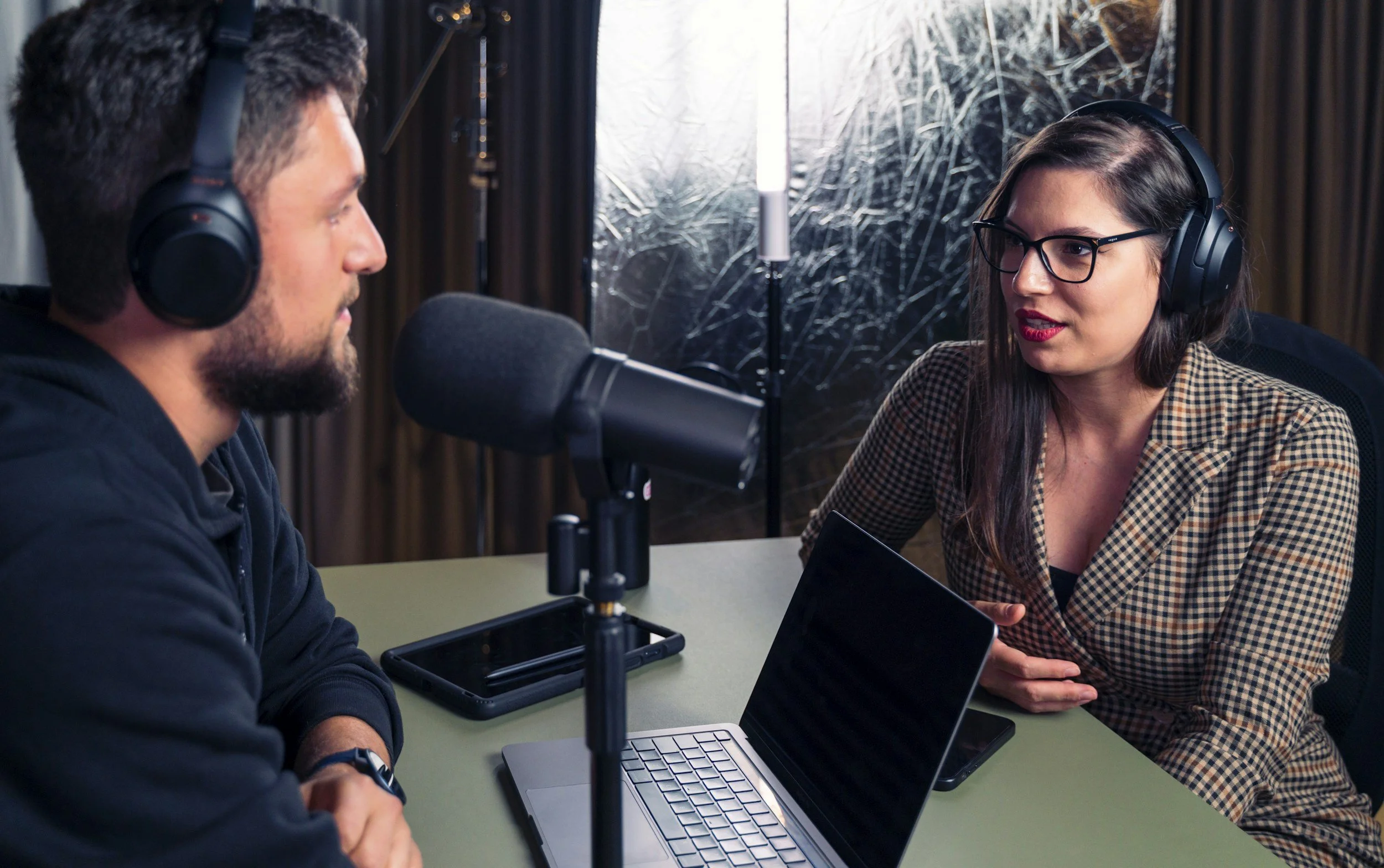Discovering and using the best strategies to generate leads for your business is a key focus for all business leaders, and with the rise of both webinars and podcasts as core marketing methods, deciding which of these to use to get the best results can be difficult.
Finding out which approach is right for not only conveying your business’s purpose and goals, but for getting the right people and businesses interested in what it is that you have to offer is crucial to remaining a sustainable B2B brand. With the ever increasing pressure to choose the right marketing strategy, you may feel lost in the debate of webinar vs podcast, so this is the place to learn which is the right fit for you depending on your needs.
Here you’ll find all of the information you need to understand these two mediums, and make the most effective decision about whether webinars or podcasts are right for you.
Both webinars and podcasts can attract attention, but the real question for business leaders is which one will bring qualified leads into your pipeline, shorten sales cycles, and build lasting trust with decision-makers.
How Webinars Draw In and Connect with Potential Customers
The first important step towards making a decision on which method is best for your B2B marketing is having an in-depth understanding about what each of these methods are. Webinars are presentations, which can be either streamed live or recorded in advance, that revolve around explaining and discussing one specific topic or idea. A key benefit of webinars is that they offer direct audience interaction, automatically boosting engagement.
Benefits of Marketing with Webinars
Webinars are a great way to showcase your expertise in your specific area, cementing to your audience your thought leadership capabilities, and building authority for yourself and your business by engaging with potential clients.
If you go into the webinar ready to interact with your audience and show them that you are a real person with the skill, knowledge and dedication that any client would want from a B2B agency, you can humanise your business in a way that so many other marketing strategies fail to do.
Between 20 to 40% of the audience of one webinar will turn into leads for your business, and this is because you are developing trust and a real connection with the people who are eager to learn from someone who is a leader in their industry. Building up authority is key, and webinars are a great way to do this.
Some other benefits of webinars include:
1. Accessibility: Since webinars are online there is the opportunity for a wide breadth of people to attend, no matter where they are, and you can build an authentic connection with every attendee without the need for physical proximity to one another.
2. Analytics: Having the opportunity to analyse the data surrounding the audience activity during the webinar means that you can adapt your engagement strategies for further webinar using the statistics from previous events. This means that you can better understand how to present your information in a way that keeps your audience hooked and wanting to ask more questions so that you can further establish your expertise.
3. Opportunity for Repurposed Content: One of the further marketing benefits of webinars is that you can take the content from that one event and use it again for things like short form content and social media.
Main Features of Webinars for Driving Leads
Webinar marketing has many advantages if your goal is to garner lead engagement and this is because of the variety of key features that webinars have to offer. In today’s climate it is common knowledge that the average attention span is rapidly decreasing, so it is critical that you keep your audience interested in what it is that you have to say in order to make your business stand out. When it comes to the webinar format, you have ample opportunity to keep people engaged the whole way through.
Interactive elements like polls, quizzes, live Q&A’s and chat options allow your audience to feel like they are not just a passive observer, but a real member of the conversation when it comes to the information you are sharing.
Further, you are able to display your own take on whatever topic you have chosen to address in the webinar, making it clear that you and your business have their own unique perspectives and offer things that others cannot.
Brand awareness and remaining memorable is another thing that webinars can help you with, because many webinar platforms give you the opportunity to implement email marketing, prompting your audience to register for other webinars, keeping your name in their minds, as a relevant source for information and potential partnership.
How Podcasts Establish Credibility and Engage with a Larger Audience
No matter who you are or what demographic you consider yourself a part of, chances are you have listened to a podcast before. The creativity and true degree of human connection that you are afforded using the podcasting medium as a marketing tool is extensive.
While this is a less interactive strategy, with podcasts you have the opportunity to give your listeners a look behind the curtain of your business depending on the tone and style you choose to implement - and you have the freedom to invite even more expert opinion in the form of guests.
Benefits of Marketing with Podcasts
Podcasts are fantastic when it comes to lead generation because there is simply such a broad and extensive audience that goes beyond the level of professionalism typically associated with the audience webinars. The convenience and dependability of podcasts is a main reason why listeners tend to keep coming back for more when it comes to this type of content, and because of this developing trust with your audience is the core benefit of podcasting.
By putting real time and effort into the information and ideas that you are sharing with your audience you can develop authority within your industry and create a connection with your audience through the humanising aspect of your voice. In fact, 88 % of U.S. podcast listeners have taken action after hearing a podcast ad, underscoring how deeply engaged and responsive podcast audiences can be
Unlike with webinars however, you are able to reinforce over time a degree of trust between yourself and your listeners, and clearly establish why your business would be the best to partner with, since your audience is consistently relying on and experiencing your expertise on a regular basis. This is why sticking to a regular episode posting schedule is so important.
Every new podcast episode is a new opportunity for lead generation, and you can continue to show your audience that you are relevant by building off of the latest information and trends within your industry, making it obvious that your business is willing to evolve with the changing times.
With the consistency of podcasts and the ability for you to more easily maintain an audience, there is also less concern about having to hook potential leads all in one short time frame. The pressure to be memorable after one interactive session, like with a webinar, is gone, because you are more than likely going to have the opportunity to engage with that same audience again once you post your next episode.
Main Features of Podcasts for Driving Leads
The primary feature of podcasts that make them such a good strategy to implement when you are focusing on driving leads is the fact that there is no restriction on where people can consume your content.
This may seem like a small advantage, but the convenience of having content that you can listen to anywhere at any time helps you to reach a much larger audience than you could with other marketing techniques.
There is simply no excuse for why people can’t be listeners. No matter how busy they may be in their everyday lives, the accessibility of the podcast format means that it can easily be put on in the background, allowing you to reach people who aren’t able to commit to other types of long-form content.
Another important feature is the ability for people to go back and listen to former episodes, allowing you to have a prolonged impact on your audience, and granting you the opportunity to potentially gain more leads in the future simply from picking up new listeners through your older content.
Reaching international audiences also becomes so much easier through podcasts because eventually you will have a foundation of previous episodes sharing your expertise, meaning even more touchpoints for new people to become listeners and engage with your B2B brand.
In addition, with the right strategy and a trusted podcast partner, podcasts create a unique networking opportunity by bringing potential clients, partners, or industry leaders onto your show as guests. Each guest episode builds relationships with people in your target audience while also exposing your brand to their networks. The impact of this is measurable: the average guest-to-client conversion rate on B2B podcasts is 10%, and one cybersecurity firm attributed $2.3 million in new pipeline over nine months to relationships built through podcast guests.
Beyond the recording itself, each podcast episode can be turned into multiple forms of content such as blogs, short video clips, social posts, and SEO-optimized articles that align with your overall marketing strategy. This multiplies the reach of a single conversation and ensures that your podcast continues to drive leads across different channels.
This is why so many leading B2B brands now use podcasts not only as a content channel but as a relationship engine with clients, partners, and investors.
Making the Choice
Now that you have a foundational knowledge about webinars and podcasts you might be thinking that both of these options sound like great marketing tools to reach your audience and turn them into leads - this means that it’s time to figure out how to decide which one works best for your B2B marketing needs.
What to Consider:
1. Which Approach to Lead Generation Fits Your Needs the Best?
If your main goal is being able to connect with your audience and to engage with your potential clients on a truly human level to build up a professional relationship, then creating a webinar is the best choice for you. If, however, your focus is on developing brand awareness and building a long term audience base who could turn into leads over time after experiencing the depth of your knowledge and process, podcasting is for you.
2. Which is the Easiest for you to Produce?
Considering the practicality of taking on either of these types of projects is important to decide which is best for you. To produce a webinar you have to create slide decks, ensure that the presentation runs smoothly and be able to manage questions and varying degrees of interaction from your audience all in real time, making it essential that you are well prepared before taking on this medium.
As a business leader, your time is best spent in conversations that build trust and showcase your vision, not in editing audio or figuring out distribution. That’s where having support from a podcast partner makes the difference.
Creating a podcast may initially seem like an easier feat, however there are many components that go into producing a professional result.
Producing a podcast for your B2B brand doesn’t have to be difficult, though. Partnering with a B2B podcast agency means having the entire process, and all of the extra work that comes along with it, handled by professionals, so you can make quality content and reach potential clients without the stress of trying to do it yourself.
One of the main benefits of a podcast agency is being able to get more marketing content through the repurposing of a single podcast episode into material for platforms like social media, newsletters, and blog posts.
3. Which Method Gives You the Best Data on Your Leads?
Being able to take in and analyse data about lead generation through either a webinar or a podcast means that you are able to adapt further content to better reflect what your audience finds valuable.
With webinars, you are immediately going to have information about the engagement level of your attendees, meaning you can see right away how best to adjust. With a podcast, you are not going to have much information right away, however you will be able to see long term trends regarding interaction as you continue to produce more episodes, meaning that you will have a more holistic data set in the future.
4. Which Format is Most Valuable to Your Audience?
Generating leads is all about appealing to your target audience, and different marketing mediums are going to have different levels of engagement depending on who specifically it is that you are trying to attract.
Webinars are going to be found the most valuable by people looking not only to be passive observers to information, but who are looking to expand upon their personal knowledge by engaging with the expert, who in this case, is you. Podcasts are most appealing to people who prefer to remain passive in their information seeking and who value the consistency that regular episode posting provides them.
5. Which Option Makes the Most Sense Financially?
A return on investment (ROI) is a critical factor to consider when implementing any kind of marketing strategy, so taking into account the costs of making either a webinar or podcast in relation to the projected impact on your lead drive is essential. While the financial aspect of both methods may vary, webinars typically cost more upfront, but podcasts are a long term commitment and take up more time as well.
A Quick Guide on Webinar vs Podcast
If you have considered all of these questions and still find yourself debating which format is best, here are some more specific key points about when to use each content type:
When to Use Webinars:
You want direct engagement through Q&A, polls, and interaction.
Your topic is best explained with visuals like slides or demos.
You need fast feedback and data from attendees.
Relationship building in real time is your top priority.
You want short-term impact for launches or campaigns.
When to Use Podcasts:
You want your content to reach a broad audience anytime, anywhere.
Your content works best as interviews or discussions with guests.
You want to build trust and authority over time.
You want long-term ROI by repurposing episodes into blogs, clips, and SEO content.
You want lead generation that compounds as old episodes keep attracting listeners.
Webinars are best when you need short-term impact through live interaction, visuals, and immediate feedback from potential clients. Podcasts, on the other hand, are better suited for long-term growth, allowing you to consistently build authority, nurture trust, and repurpose each episode into multiple content formats that continue generating leads long after release.
Conclusion
While both marketing strategies have grown immensely in popularity because they grant businesses the opportunity to build authority and authentic connection with others, turning audiences from consumers into potential clients, choosing between the two strategies really comes down to what matters most to your B2B marketing strategy.
If your focus is on audience engagement and creating an interactive space where you can drive leads, webinars may be the right fit. But if your priority is lasting brand authority, scalable content, and a steady stream of qualified leads, podcasting is the channel that continues to deliver long after each episode goes live.
So, which format do you think would work best for you? Let me know!
Written by Eva Geimer
-
Jony Studios is a content marketing agency specializing in B2B podcasting and audiobook services. They have worked with many clients, from startups to larger organizations such as Penguin Random House, Amazon, University of Waterloo, Freakonomics Radio, and many others.





